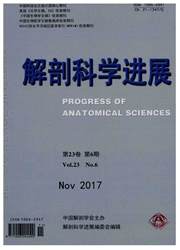

 中文摘要:
中文摘要:
肌肉的损伤修复是一个动态协调而又极其复杂的过程,TGF-β是一种内源性的生长因子,在肌肉损伤后通过重新编码肌肉细胞基因,抑制生肌细胞基因的表达,骨骼肌内TGF-β产生于损伤反应中,在损伤愈合的各个阶段均起作用并受TGF-β浓度的影响,TGF-β的生物学效应也受到其它生长因子的拮抗或协同作用,使用TGF-β阻断剂可以拮抗TGF-β进而减少肌肉纤维化,改善肌肉愈合质量。本文回顾了骨骼肌损伤修复与转化生长因子β的作用,并对转化生长因子B在肌肉损伤修复方面的应用前景进行了分析和探讨。
 英文摘要:
英文摘要:
The muscle injury and regeneration is a complicated process accompanied with various dynamic interactions. TGF-β is a kind of endogenous growth factor by re-encoding the genes of muscle cells and repressing the genes expression of myogenic cells during the regeneration. TGF-β could be induced by the injury responses in the skeletal muscle during the injury and regeneration depending on the concentrations of the TGF-β. The biological effects of TGF-β can be interacted with other growth factors by the manner of antagonism or synergism. The fibrosis could be reduced and the regeneration could be improved by applying the inhibitor of TGF-β. Here we reviewed the role of TGF-β with the skeletal muscle regeneration after injury, and disscussed the prospects of the TGF-β in the skeletal muscle injury and regeneration.
 同期刊论文项目
同期刊论文项目
 同项目期刊论文
同项目期刊论文
 期刊信息
期刊信息
